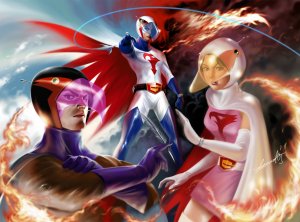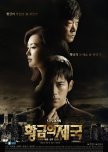
Early on, there are two scenes that portend what’s to come. One is when Sungjin’s chairman apologizes for involving his daughter in the family business and its innate “dirtiness,” which he had hoped to shield her from; and the other is a noodle peddler’s son, now a high-stakes broker, proclaiming that business is “war.” From then on, moral scruples are subordinated to vindictiveness and revenge, putting everything, including blackmail and the covering up of a murder, on the table, as viable options.
With no heroes per se, I found myself pulling for the three characters who want nothing more to do with power and prestige (to the extent they try to sabotage their nearest and dearest who are busy selling their souls for the sake of the “Golden Empire”) to be the ones who resolve the drama’s ending. It was wishful thinking, as there has to be a winner and a loser(s), and as it would’ve been implausible for a truce to be called and the winner declared in the spirit of fair play after all the no-holds-barred beat-down of one another. And the writers don’t disappoint. To quote Adam von Librikov “Death is a matter of style.” And death, stylish death, is the note which the drama’s most heroic character goes out on while its most attractive is left to ponder the unbearable cost of winning.
Esta resenha foi útil para você?

To my surprise, the first episode had me completely absorbed. Before I knew it, I was past the point of no return and found myself rooting for Empress Dowager Chun Chu to get control of Goryeo's throne; for Kim Chi Yang's duplicity and betrayal to be revealed; and for the Empress Dowager of Khitan to prevail over her son, the Emperor, who wants go to war and make Goryeo a tributary state.
The story obviously had me engrossed. Among the characters and the actors who portrayed them, the actor who plays the role of the mad king, whom Chun Chu marries, stands out. The role requires the actor to be rude, boorish, churlish, etc., and I can only imagine how fun that was for the actor to play and it shows in his acting, which is at times both electrifying and laugh out loud funny. As to Chae Shi Ra, she plays her lead role with consummate skill. She has to lest the entire drama crumble and collapse.
Finally, I learned something watching The Iron Empress. I had no idea that the Khitan or the Liao Dynasty was a massive and influential power that rivaled the Song Dynasty. I learned they were a nomadic tribe that transformed itself into a civilized culture and military superpower, a precursor of sorts of Genghis Khan and the Mongol Empire.
Two more things: I gave the drama an overall rating of 8 because there are about 15 episodes that are fillers or padding, and the fighting scenes showing the character Gang Jo wielding his spear is the most awesome display of martial arts I've seen in all of K-Drama.
Esta resenha foi útil para você?

My verdict? It won't be long before I see it for a third time, which might make you wonder why I gave it pathetic music rating. I gave it a pathetic music rating because there is no music to speak of, none, zilch, nada, not unlike_No Country for Old Men_. Alas, unlike _No Country for Old Men_, _Christmas in August_ has nothing to commend itself in terms of a suspenseful plot, cinematography-rich settings,or a villain so compelling as to make your skin crawl.
What it does have is a reality which you would not have known could ever have existed and conveyed with such subtlety and nuance that you're reaction upon viewing would probably be along the lines of "What?!" To be sure, it's a thinking man's film,one if you could ever get your head wrapped around, you might experience what I did the second time around: an ineffable sorrow which shedding tears for would be vulgar in the extreme.
Esta resenha foi útil para você?

As melodramas go, _Passionate Love_is actually brief at 47 episodes. If you can tolerate the usual, well intended stupid things the heroes will do and the usual, unbelievable, underhanded evil the villains will get away with, you'll like the drama despite the hurried ending, which wrapped things up a little too neatly. In fact, I felt that the shortened ending was actually good for the drama. The thought of Han Yoo-jung stewing in her hate and wallowing in her pain and misery because she is too good to take justice into her own hands was just too much to take.
Esta resenha foi útil para você?

Needless to say, I got over my biases and I was rewarded. Secret Love Affair is a stylish, intriguing drama that confronts its heroine with the most impossible of choices: Give up everything you ever lived for and live in poverty for love or continue to live for ambition and deny your feelings unto eternity. I knew the first option was unlikely. (K-Drama does not do poverty and squalor even if passionate love is at the heart of it.) I thought the second option was the only option but a bad option nonetheless. As it turned out, there was a third option, and it revolved around a funny development in the story. Everyone, who means anything to the two lovers, finds out about the affair, but no one condemns the couple. Friends are supportive, and friends who aren’t real friends promise to sweep it under the rug provided the heroine takes the fall for the financial indiscretion of a higher up, or so I gathered. (My attention waned towards the end.)
As befitting a heroine, the heroine defies her enemies and protects her lover. The way she does it—acting as if she has done nothing wrong—however doesn’t do much to build the drama to an exciting ending. It was fun getting there though.
Esta resenha foi útil para você?

Wikipedia’s entry on Gye Baek is brief but harrowing. In fact, you’ll think Gye Baek a demon, a monster, a psychopath. The drama will convince you otherwise.
Fighting for an ideal will always end in tragedy and that’s what Gye Baek is, a life spent in the service of his country at the expense of a woman’s love, personal happiness, domestic bliss, etc. The irony of it all is that Gye Baek is brought up by a father who tries his darnedest to steer the boy clear of honor, patriotism, and all “those big words which make us so unhappy,” to quote James Joyce.
Tragedy is a word thrown around rather loosely. It should be reserved for deaths that inspire awe and that stir us to act regardless of added pressure to do so. Gye Baek will be on my mind for a very long time and will be especially pertinent whenever heroism and/or tragedy are gratuitously mentioned.
Esta resenha foi útil para você?
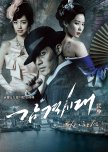
If you can look past that, which I managed to do, _Inspiring Generation’s_ story arc and setting are as appealing as they get in K-Drama. They involve the progress of Shin Jung-tae from his formidable days as a rickshaw runner in a small, provincial town in occupied Korea to his days of triumph as champion/freedom fighter on behalf of persecuted refugees in cosmopolitan, occupied Shanghai, on the eve of WWII.
Along the way, all sorts of characters come and go, and I found these to be the real strength of the show. Do Ggoo, the fawning, treacherous lackey, I found especially fun to watch. The screen presence of Aka, the Ill Guk-hwae assassin of the few words and artificial left eye, was effectively menacing. There was So So’s latrine cleaning, sharp-tongued father whose jokes and irreverent remarks were good for many laughs. And then there was the roguish but charming Jung Jae-hwa, the boy who is sold by his parents for money but who grows up to be the boss of the Shanghai refugee district. (Kim Sung-ho, who plays Jung Jae-hwa, steals every scene he’s in.)
Another thing that _Inspiring Generation_ has going for it is its lack of a gratuitous romance dragging down what is essentially an action thriller. _IRIS_ and _City Hunter_ had that problem, but at no point in _Inspiring Generation_ do you get the feeling that the writers are forcing the romance angle to prolong the series or to manufacture an artificial plot twist. I know that Ok Ryeon wasn’t a particular favorite, but I thought her character evolved nicely, culminating in a moving, tragic end.
Esta resenha foi útil para você?

According to the film, the seven kingdoms became China because a farmer and a prince exchanged roles in terms of their deepest held convictions. The farmer wants to live, embracing peace, understanding, and sensible compromise. The prince wants to live too but to live proudly and honorably even if that means war and death.
It’s hard not to empathize with the farmer, but by film’s end, as the credits role, you can’t help but to see how right the prince was to do as he had done despite the destruction of his army and the suffering of his people. To live in peace means very little without pride and honor. So much for the film’s thematic content. Cinematography-wise, the film is first rate, even breathtaking. The OST is impressionable, and the acting...Well what can I say? Jackie Chan is so likable, and he was especially so in his moments of repose when he would persuade Wang Leehom, who plays the Wei crowned prince, of life's preciousness.
A fellow reviewer mentioned that this film was a labor of love, that Jackie Chan had spent decades trying to get it on film. I'm grateful that the "greatest action star in film" was as stubborn and as dogged as he was.
Esta resenha foi útil para você?

In Wonderful Days, a Seoul prosecutor, who is estranged from his family, reluctantly returns home to solve a murder case. Initially, with the aid of flashbacks, the drama delves into the cause of the prosecutor’s estrangement from his family, relegating the murder case on the back burner. The estrangement aspect is done so well, one almost forgets about the murder case which is actually very cleverly embedded in the developing events. The problem is that the murder case is resolved at around the drama’s midpoint, solely putting the burden on the estrangement aspect to carry the drama, to its end.
And here, Wonderful Days resorts to all sorts of convoluted complications to ratchet up the estrangement angle only to undermine the great job it had already done: What had been dramatic, funny, clever, and light becomes melodramatic, silly, tiresome, and heavy.
Of course, having already invested so much of my time in it, I had to see Wonderful Days to its end. And typical of K-Dramas it delivers. It delivers the sort of “feel good” send off to make up for the preoccupation with Han, the Korean culture specific conception denoting guilt, resentment, and resignation that most, if not all, K-Dramas exploit, for better or worse.
Esta resenha foi útil para você?
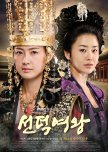
Then there was Ko Hyun-jung who plays Mishil.
I don’t think a K-Drama villain has had a better screen presence than Ko Hyun-jung’s Mishil. It was a combination of the music, the costume, and the close-up shots of Ko Hyun-jung’s Cheshire Grin, featuring a raised right eyebrow and dilated unblinking eyes, not to mention the character’s habit of referring to herself in the third person, that made Mishil THE character you loved to hate. It was the finest example of doing a lot by doing very little, a stroke of directorial genius.
Having said that, the drama had a glaring weakness; namely, the fictional liberties taken with Bidam only to try to have it both ways and make Bidam resemble his historical version. Though the same strategy is successfully applied to Deokman/Queen Seonduk, I never quite bought the love that supposedly existed between Bidam and Queen Seonduk, which was key in affirming Bidam’s historical credentials within the drama’s context. If Queen Seonduk loved anyone, that was Yushin. Friendship, sympathy, and compassion were more plausible when speaking of the feelings that existed between Bidam and Queen Seonduk.
Having said that, Queen Seonduk has a lot more going for it than against. The episodes dealing with Mishil’s palace coup, Princess Deokman’s staging of a solar eclipse, and Deokman’s formative years in the desert, are some of the most colorful, cinematic, and compelling K-Drama I’ve ever seen. They themselves are worth investing the 62 hours of one’s life that Queen Seonduk demands of the viewer.
Esta resenha foi útil para você?
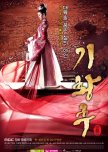
Stunning is the word that comes to mind. And this is a first when applied to Korean historical dramas which I’ve always shunned under the impression that they were mostly palace intrigues involving a lot of stuffy, elevated speech in grave, dimly-lit, austere settings. Indeed, _Empress Ki_ had enthralled me so that it wouldn’t surprise me if Korean historical dramas comprise my current watch list to the exclusion of all else—at least for the time being.
Its epic scale was its chief appeal. The story’s settings encompass a continent as it begins in ancient Korea and then moves westward to Beijing all the way to the Silk Road and China’s western frontier before settling for good in Beijing and its environs, with a brief sally back to Korea. The story is equally epic as it has, in the broadest strokes, a love triangle involving an emperor, a king, and a self-made empress; strife and unrest among nations and ethnicities; and a palace intrigue replete with the usual murders, betrayals, and acts of revenge, more than meriting the drama’s allotted 51 episodes. There was a moment of doubt, at episode 38, when what seems to be the story’s biggest conflict—the heroine’s ouster of the inveterate tyrant—is resolved; but it didn’t take long for the tension and suspense to rebuild, putting me once again on the edge of my seat chewing my fingernails.
Just how much I was moved by _Empress Ki_ can’t be said enough. Even the villains evoked my sympathy: namely, when Tanggisi helplessly watches his sister get executed and when, fending off his assassins, Regent Bayan calls for his nephew’s help only to fall under his nephew’s sword. Even Yom Byung-soo, who I wanted to see boiled alive in a cauldron (in the old Mongol style), had a moment deserving of my sympathy: namely, when he sighs in dismay at Tanggisi’s mission objective if or when El Temur's hidden treasure is found. (Tanggisi wants to raise an army and regain control of Yuan when all Yom wants to do is retire and live the good life.)
Esta resenha foi útil para você?
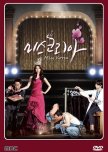
There are a number of candidates for the impossibly bad villain from a mid-level gangster boss to the successful-business-guy and rival lover of the heroine to the greedy, ambitious rival company manager to the rival beauty salon owner to the despicable department store manager of the “elevator girls.” Incredibly, every one of these candidates, with the exception one, turns over a new leaf and becomes a likable and sympathetic character. (At the end, even the potential villain, who holds out in turning over a new leaf, concedes victory to the hero.) Moreover, the bid to become Miss Korea, which is one of the two conflicts upon which the drama revolves, is decided around episode 15 of a 20 episode series.
At this point, the drama hangs on the question of whether the hero’s cosmetic company will survive and prosper. Alas, what with all but one of the potential villains having become the hero’s and heroine’s allies, by this point, it seems inevitable that the company will survive and most likely prosper. Whatever must-see value the drama then has is diverted to a side story which involves the possible romance between the reformed gangster boss with an elementary school education and the Ph. D. chemist who works for the hero’s cosmetic company. Though the side story is sweet, it’s not enough to fill in the vacuum left by the premature resolution of the Miss Korea contest and the inevitable financial success of Vivi Cosmetics.
Esta resenha foi útil para você?

O Livro dos Três Han: O Capítulo de Jumong!
4 pessoas acharam esta resenha útil
Nabokov says that the real drama of any book isn’t between the characters but between author and reader(s). Reading KING LEAR is a good example of this notion. It’s a condemnation of perceptions arrived at by the easiest of routes which people tend to do by no fault of their own as their education is lacking and/or they are too naïve and trusting to take words at anything but at their face value.
I first saw Song Il-gook in BODYGUARD. Recognizing his face in JUMONG made me smile. I doubt the recognition was mutual, but I like to think it was. In any event, there were other actors and actresses who I recognized from their previous screen incarnations, and my general thought was “Hey, it’s you again.”
I suppose I could mention all their names paying each and every one my respects but I’m sure that would only exacerbate my exorbitant debt which is growing still and at an exponential rate. So I humbly submit my thanks or as Hamlet says “Beggar that I am, I am even poor in thanks, but I thank you.”
By the way, the drama is first rate as is the soundtrack.
Esta resenha foi útil para você?

I'm happy to inform you that Emergency Couple is the exception to the aforementioned rule; to wit, its premise: A prince and a servant maid, who are in love, defy their elders and marry but just as quickly fall out of love and divorce. Coincidentally, they meet again as fellow medical doctors in training and fall in love all over again.
At first, I was skeptical. The ads had me thinking that it would be a silly comedy with a lot of improbable situations thrown in for the sake of cheap laughs. Boy, was I wrong. There was silliness, but for the most part, human flaws and how they undermine our best intentions were the show's focal point. Funny, sad, and poignant is how I would characterize the general tone and tenor of the show.
For any show to succeed, the main leads have to shine and they did. That the supporting roles almost impressed me as much is an endorsement of the show that needs no further comment.
Esta resenha foi útil para você?
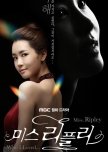
Who cares is what I say. Just do it: Fall in love, slay your enemy, assess Miss Ripley.
Not bad is my initial reaction.
A drama appeals to its viewer in one of two ways: 1) It grants the viewer a portal into an alien world or 2) It acts as a mirror to the viewer's own world.
To me, Miss Ripley is a case of the former, and I thoroughly enjoyed the depiction of a con artist from a seedy underworld who manages to make fools of the upstanding and the respectable. A drama, however, cannot sustain itself on shock value/edgy content alone. As it often happens in life, the lies with which the con artist gets away with murder catch up to her, and it's here where the drama stretches the seams of plausibility past their resiliency threshold.
Or perhaps I'm being too cynical.
I'll close by paying my complements to the composer of the haunting piano piece the drama features when Kim Seung Woo's character uncover's the titular heroine's seedy past.
Esta resenha foi útil para você?

